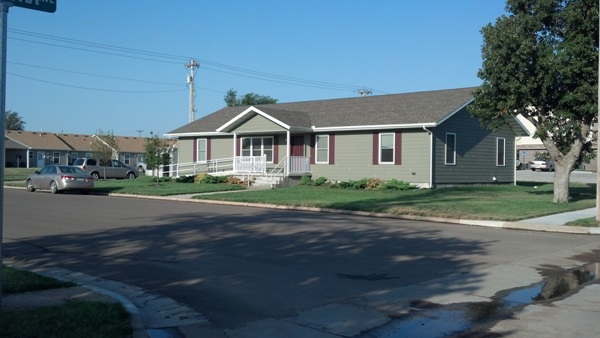In 1998, ICHD opened our first Transitional Living Home, the Julius House. Named in memory of Julius Boone, an individual who was a model for the type of program ICHD wanted to build, the Julius House can serve up to four adults with severe and persistent mental illness to help teach skills needed to live independently.
Along with the Kelley House, in memory of Lori Kelley who successfully completed this program, the Iroquois Center has helped hundreds of people successfully transition from nursing facilities, state hospitals, and other more structured environments, into this and surrounding communities.
The homes are four bedroom homes with complete living areas, kitchen, 2 baths, basement, and storm security areas. Both houses are handicap compliant.

The Goal - Independent Living
The goal of the Transitional Living Program is to create healthy habits that can be carried over into independent living. We have found that when an individual has healthy routines and habits, they are better able to manage symptoms and maintain a higher level of functioning in the community.
- Medication Management
- Cooking
- Cleaning
- Symptom Management
- Managing ADLs (bathing, personal hygiene, etc)
- Positive Social Interactions
- Healthy Nighttime Routines


Consumers will stay in the program for 3-12 months, working with the Transitional Team, the CSS Team, Case Managers, and Therapists. The program is highly individualized so we can fit the needs of each client.
After completion of the Transitional Program, our Teams work together to assess the individuals progress and determine if they are ready for independent living. Case Managers will help with housing process. Consumers may continue to attend groups and receive services from Iroquois after they moved out.
Are staff available?
Each house is staffed at all times consumers are home. Staff are available to provide support and teach skills that would be helpful to each person. The program is individualized, and we work at the pace of the individual.
What are the costs?
In most cases, services are billed directly to insurance providers. In that case the only non-covered expense is rent and funds for activities and outings. If you are not sure about your insurance, contact us and can help determine eligibility.
Who can qualify for Transitional Living?
The Transitional Homes are for consumers who are diagnosed as SPMI who are in the needs of learning living skills to be prepared to live independently.
What are the requirements to qualify?
Must not be a risk to themselves or others. Able to dress, bath, and feed themselves. Able to move themselves (wheelchair friendly). Moving from more restrictive to less restrictive environment. Potential to transition to independent living within three to twelve months. History of medication compliance. Primary diagnosis of a severe and persistent mental illness.
Iroquois Center for Human Development is proudly powered by WordPress